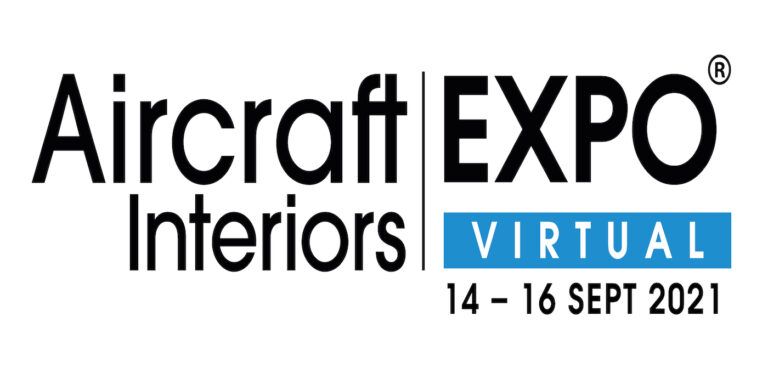Professionals from across the aircraft cabin interiors and onboard services sectors came together online on 14 September to join the first day of the Aircraft Interiors Expo (AIX) and World Travel Catering & Onboard Services Expo (WTCE) Virtual events.
Among the products demonstrated online at the start of the three-day event was MGRSoftWall NextGen quick release, a vertically mounted, lightweight panel system that can be used in cabin applications ranging from seat structures, suite walls, bulkheads, partitions and monuments, to sidewalls and ceiling panels. Developed by MGR Foamtex, the Nextgen panels feature Zotek F OSU XR foam, which the company claims makes them 50% lighter than its regular MGRSoftWall panels.
Meanwhile Intelsat demonstrated how its software-defined connectivity network can be combined with a robust in-cabin network to optimise an ever-growing range of airline services and operations. Intelsat‘s 2Ku system provides the bandwidth needed to meet growing crew and passenger demands, while smart software ensures the bandwidth is distributed optimally across the aircraft cabin network.
Hungry for more?
Across the exhibition ‘hall’, suppliers from the onboard hospitality industry revealed the latest food and drink products and retail solutions at WTCE Virtual. Among the highlights, Foodcase International demonstrated a new concept for buy onboard and pre-order, including a selection of Western and Asian-style ready meals based on authentic and local favour profiles created by local chefs. Meanwhile Gourmet snack manufacturer, NibNibs, showed its newly launched Telstar Heavenly Cookies, and the Indulgent mini star cookie, which is not as indulgent as its name suggests, having 30% reduced sugar and no artificial sweeteners, colours or preservatives.
Industry experts share their thoughts
Attendees at the events have the opportunity to learn from 100+ speakers across three conference streams and 30 sessions, with a line-up of speakers including airlines, suppliers, analysts and consultants.
The Passenger Experience Conference was opened by Simon Calder – travel correspondent at The Independent and a regular guest speaker on Sky News, BBC Breakfast and CNN – who went on to led a panel on ‘Putting people at the heart of each journey in the digital age’. He was later joined by representatives from Seymourpowell, Accor Hotels and ANA, who explored how the aviation industry can safely bring the human touch back into flying and create new personal and people-centric experiences.
The session was followed by representatives from Avensis Aviation, Airbus, Mormedi, Alstom, JetBlue Airways and flypop in the ‘New cabins, new routes – the show goes on’ discussion. The panel explored how underlying passenger experience business models are evolving to create robust businesses for the future.
In the final session of the day, ‘D is for dignity: democratising air travel for passengers with disabilities’, experts from Flying Disabled, Avionics, Heathrow Airport and FACC were joined by Nico Langmann, a participant at the Paralympics Tokyo 2020, who came together to discuss how the aviation community can collaborate to take a harmonised and human-centric approach to accessibility.
Senior airline leaders converge
Kicking off the first day of AIX Sessions, John Strickland, director of JLS Consulting, welcomed senior airline leaders including Tom Stevens, British Airways’ director of brand & customer experience; Birgir Jónsson, CEO of airline newcomer, Play; and Tonje Wikstrøm Frislid, CEO of Flyr, another new airline, to explore how airlines have adapted to new passenger needs and what the future holds for new airlines starting from a blank slate. Another discussion on day one, ‘Airlines: the leadership discussion,’ revealed how the pandemic has acted as a catalyst for innovation and in the case of Flyr and Play, created all new opportunities for the emergence of new players in the airline industry.
Among the shared themes covered in the panel, the increasing need for a frictionless travel experience was embraced by all, with Tonje Wikstrøm Frislid from Flyr revealing that the airline’s ultimate goal was to deliver “a friction-free and friendly journey – from booking tickets online to checking in and arriving at the destination.” She also revealed that the data-driven approach being undertaken by the airline meant it could “personalise it communication across multiple customer channels and journeys.”
Looking to the future, all of the panellists agreed technology would play an increasingly important role, representing one of the most fundamental aspects of how airlines and the wider aviation sector have transformed as a result of the pandemic.
Sustainability: a defining issue
Sustainability has become a defining issue for airlines. “Pre-pandemic, change was already gathering pace, with businesses renewing their fleets, investigating sustainable fuels, and identifying new ways to bring efficiencies onboard,” said Reed Exhibitions, the organisers of the events. “Although Covid-19 has pushed the conversation back a little, it has accelerated the pace at which airlines are looking to change, for the better.”
At AIX Sessions, Lukas Kaestner, co-founder of the Sustainable Aero Lab, and new president of the Crystal Cabin Awards, was joined by Dr Achim Leder, co-founder and CEO of Jetlite GmbH, Nico Buchholz, founder of Flightlevel 500, and Omer Bar-Yohay, founder of Eviation Aircraft. The panel discussed ‘Encouraging the start-up scene in aviation: How they can help achieve sustainability goals’.
Meanwhile panellists speaking at the Taste of Travel at WTCE Virtual also highlighted the latest thinking when it comes to sustainability trends. Led by Sarah Klatt-Walsh, founder and owner of Sarah Klatt Consulting, leaders from the aviation sector discussed how airlines and suppliers should collaborate to reduce waste and improve the customer’s onboard experience in the ‘Why hospitality Is key to rebuilding passenger confidence’ session.
Melanie Berry, Director of Customer Experience at Iberia, kicked off proceedings, reviewing how the airline has been making progress in reducing plastic use. She said that “customer experience has to be as sustainable as it can be” and that all new innovations should be reviewed to see how “truly sustainable” they really are.
Matt Crane, the founder of The Aviation Sustainability Forum, went on to explain that collaboration is key to make the sector more sustainable. He said that it was vital businesses “come together to develop solutions that are sustainable at source and optimised for waste management”, adding that the industry needed “to do better and find ways to break down barriers”, particularly when it comes to the way waste is managed.
The session also saw sustainability champion Anne De Heuw, founder of IN Air Travel Experience, discuss the “waste hierarchy”, explaining why it is important to move waste higher up to avoid it being incinerated or put in landfill sites. She said that “a move to a circular economy is essential” an economy in which products are reused and those that can’t should be made to last longer.
Ariane van Mancius, founder of NowNewNext, also explored the topic of veganism and how the trend is growing globally, adding that airlines need to introduce ‘true ticket’ pricing, where the cost reflects how sustainable a journey is.
Day 2: more opportunities
Day 2 of AIX and WTCE Virtual, and the Passenger Experience Conference (PEC) were another success. The PEC began with experts from Lufthansa Systems, Virgin Atlantic, Lufthansa Group, Deutsche Telekom AG and Customer Experience Consultancy, who discussed ‘How airlines can offer their passengers more value with digitisation and outstanding customer experience’, and the importance and potential of customer experience on inflight connectivity.
The second session of the PEC explored how the pandemic has fast-tracked new thinking on cabin materials and manufacturing techniques, as well as the adoption of technologies and methodologies that can help enable innovation and co-creation. Representatives from Tangerine, ADS, Cecence, e2ip Technologies, Munich Studio Designworks, and the ZAL Center of Applied Aeronautical Research discussed ‘How innovative materials and methodologies are underpinning recovery’, and how these approaches are changing the way the passenger experience community collaborates.
Moving on, speakers from FlightGlobal, Diehl Aviation, Doy Design, Boeing and Collins Aerospace debated how to reduce the cabin’s environmental footprint, and how climate change is demanding disruptive thinking from the entire aviation industry. The final session looked at ‘Strategies for a digital revolution in the cabin’, with insights shared by representatives from PaxEx.Aero, IATA, Inmarsat Aviation, Safran and SITA.
Highlights from Day 2 of the AIX Sessions include a presentation on the ‘Outlook for commercial aviation and the interiors market’, moderated by Andrew Doyle, senior director of strategy at Cirium. Rob Morris, head of consultancy at Ascend by Cirium, was first to take the virtual stage, sharing the latest insights on the outlook for commercial aviation and debating whether the landscape has changed forever post-pandemic. He discussed the company’s ‘scenario projections’ for the future, looking at when demand might recover to 2019 levels. One such scenario, coupled with new IATA forecast data, predicted a strong rebound in traffic in 2022, implying a strong recovery in both active fleet and utilisations.
Gary Weissel, managing officer at Tronos Aviation Consulting, was next up, discussing how fleet size is currently driving the aircraft interiors market, sharing a five-year forecast for regional jets, widebody and narrowbody aircraft. Safran’s global VP of business development, Beth de Young and Harald Mehring, CCO of Diehl Aviation then joined a panel discussion, delving deeper into the key issues facing the aviation sector.
Over at WTCE Virtual’s education programme, the Taste of Travel sessions featured discussions regarding food allergies and managing wellness onboard. The panel, featuring experts from Niche Free From Kitchen, Virgin Atlantic, Food Allergy Aware and Creative Nature debated whether certain allergens should be banned completely. One of the panellists, founder of Creative Nature, Julianne Poonan described how she was once refused access to board a plane due to her severe and multiple allergies, despite having advised the airline in advance.
With an increasing number of people suffering from severe allergies, the panel discussed whether it would make sense to ban certain allergens from the aircraft completely. Caroline Benjamin from Food Allergy Aware commented, “People don’t smoke on flights anymore because of the health risks, so why do we allow, for example, peanuts onboard?” People might think it’s an infringement of their human rights but I’m sure passengers would be happy with an alternative if it meant keeping someone safe.”
Experts from IFSA Foundation Board and Hayward Partnership, LSG Group, Purpose Made Solutions Limited, Niche Free-From Kitchen and Monty’s Bakehouse explore the opportunity for careers in onboard hospitality. The panel revealed how the pandemic has impacted the talent pool, with many companies having to re-boot with fewer people. With a real need to build back the strength of the knowledge pool and to encourage companies to rethink how they recruit, the panel addressed the critical question of how to bring the onboard hospitality industry to the forefront as an exciting and enticing choice for those new to the industry.
The Taste of Travel and AIX Sessions are available on-demand for attendees to view on the final day of AIX and WTCE Virtual.
More launches and product innovations
The 150 exhibitors revealed more product innovations on day two of the events. Deutsche Telekom revealed how its inflight connectivity systems can take the passenger connectivity experience to the highest level. Using the industry’s largest partner ecosystem, the company is supporting the aviation industry by streamlining processes and sharing insights on what passengers really want. All that enables revenue growth along every step of an airline’s journey – pre-flight, in-flight and post-flight.
At WTCE Virtual, PLAYin CHOC showcased its range of chocolate products, which have won 19 awards since the company launched in 2018. The brand’s packaging is 100% recyclable and plastic-free, while the ingredients are natural, organic and Soil Association certified. Being vegan and free from 14 of the main allergens means they can be enjoyed by almost everyone.
Another exhibitor, Snackboxtogo, showed its range of premium onboard snacks in sustainable packaging, such as Rösti Snack, a carbon-neutral potato nibble. The company also distributes cashews from Sunshine Nut Company, produced in Mozambique, where they are harvested, roasted and packed in airtight 30g bags by local people, meaning they are fresh and have a low carbon footprint.
Day 3: Your final chance to source, network and learn
AIX and WTCE Virtual returns today for the final day of sourcing, networking and learning opportunities. Attendees can join exhibitors to explore the latest solutions for the global cabin interiors and onboard services industries, while a busy day of conference sessions will shine the light on a number of the most prevalent trends and challenges facing the industry.
At the Passenger Experience Conference, attendees can join live sessions on the following:
- Passenger engagement as a service – the new revenue driver? (11:00-12:00 CEST)
- Getting ready for the next round of disruptive innovation (15:30-16:30 CEST)
For more information and to register to attend, click here for AIX and click here for WTCE.





